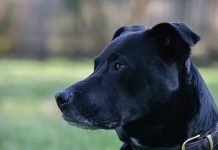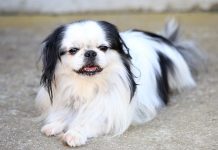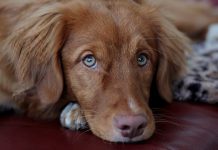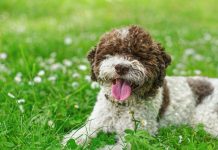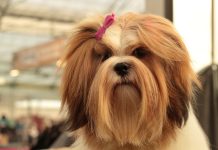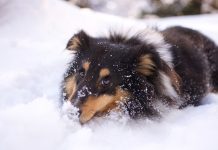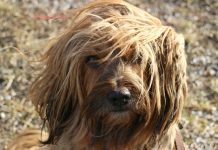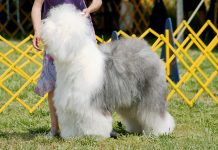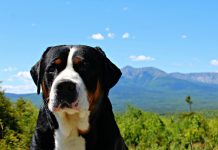History and Origins of the Rhodesian Ridgeback:
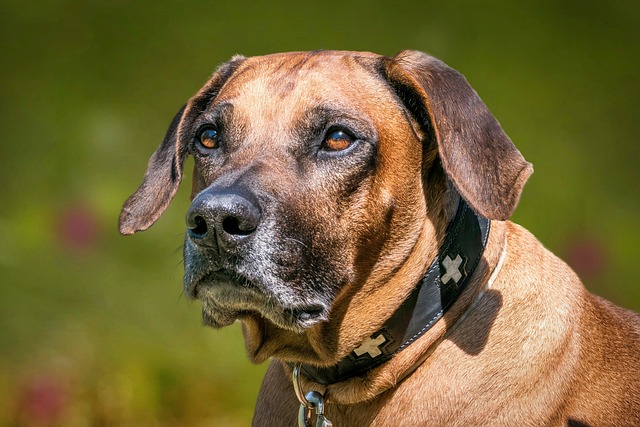
- Southern African Origins: The Rhodesian Ridgeback originated in Southern Africa, specifically in the region that is now Zimbabwe (formerly Rhodesia). They were developed by the indigenous Khoikhoi people and later refined by European settlers in the 19th century.
- Hunting Heritage: The breed’s primary purpose was as a versatile hunting dog used by the indigenous tribes for tracking game, including lions. They were particularly prized for their ability to hold large game at bay while awaiting the arrival of hunters.
- European Influence: European settlers arriving in Southern Africa brought their own dogs, such as Bloodhounds, Mastiffs, and Greyhounds, which were crossed with the local Ridgeback dogs. This led to the development of the breed we know today.
- Role in Lion Hunting: Rhodesian Ridgebacks were selectively bred for their distinctive “ridge” of hair along their back, which is formed by a symmetrical line of hair that grows in the opposite direction to the rest of the coat. This ridge was thought to be a mark of courage and was valued in the breed’s lion-hunting history.
- American Kennel Club Recognition: The Rhodesian Ridgeback was officially recognized by the American Kennel Club (AKC) in 1955 and is classified as a member of the Hound group.
Physical Characteristics and Appearance of Rhodesian Ridgebacks:
- Size: Rhodesian Ridgebacks are large and muscular dogs with a strong, athletic build. Adult males typically stand between 25-27 inches (63-69 cm) at the shoulder, while females are slightly smaller, ranging from 24-26 inches (61-66 cm).
- Weight: Adult males typically weigh between 85-90 pounds (38-41 kg), and females weigh between 70-75 pounds (32-34 kg).
- Distinctive Ridge: The most distinguishing feature of the Rhodesian Ridgeback is the ridge of hair along its back, which runs in the opposite direction to the rest of the coat. The ridge should be clearly defined and symmetrical.
- Coat and Color: Rhodesian Ridgebacks have a short, dense, and sleek coat that lies close to the body. They come in various shades of wheaten (light tan to red), with or without a black mask on the face.
- Head: The head is broad and flat, with a moderate stop. The eyes are round, expressive, and should be a shade of brown. Ears are set high, medium in size, and fold forward.
- Muscular Build: Rhodesian Ridgebacks have a powerful and well-muscled physique, reflecting their history as hunting and working dogs. They are built for endurance and agility.
- Gait: The breed moves with a smooth, effortless, and ground-covering stride. Their movement should be balanced and efficient.
- Temperament: Rhodesian Ridgebacks are known for their dignified, intelligent, and independent nature. They are loyal and affectionate with their families but can be aloof with strangers.
- Exercise Needs: As active and athletic dogs, Rhodesian Ridgebacks require regular exercise and mental stimulation to thrive. They enjoy activities such as jogging, hiking, and agility training.
In summary, the Rhodesian Ridgeback is a distinctive and versatile breed with a rich history as a hunting companion in Southern Africa. They possess a unique appearance, including their characteristic ridge of hair, coupled with a strong and athletic physique. This breed’s temperament is marked by loyalty, independence, and intelligence, making them excellent companions for active individuals or families who can provide them with the physical and mental stimulation they need.
Rhodesian Ridgeback Temperament and Personality Traits:
- Loyal and Affectionate: Rhodesian Ridgebacks are deeply loyal to their families and form strong bonds with their owners. They are affectionate dogs that enjoy spending time with their loved ones.
- Independent and Dignified: Ridgebacks are independent thinkers and can have a somewhat aloof demeanor, especially with strangers. They are known for their dignified presence and self-assured nature.
- Courageous and Fearless: Bred as hunting dogs, Rhodesian Ridgebacks possess courage and fearlessness. They are not easily intimidated and can be protective of their families if they perceive a threat.
- Intelligent and Problem-Solvers: Ridgebacks are intelligent dogs that can quickly learn new tasks. However, they can also be stubborn and may require patient and consistent training.
- Good with Children: When properly socialized, Rhodesian Ridgebacks can be excellent companions for children. They are typically gentle and tolerant but should always be supervised around young kids due to their size and strength.
- Reserved with Strangers: Ridgebacks are naturally aloof with strangers and may be wary of unfamiliar people or situations. Early socialization is crucial to ensure they remain confident and well-adjusted in different environments.
- Active and Energetic: Rhodesian Ridgebacks are athletic dogs that require regular exercise to stay healthy and happy. They enjoy activities like running, hiking, and interactive play.
- Minimal Barking: Ridgebacks are not known for excessive barking. They are generally quiet and reserved but will alert their owners to potential threats.
Training and Socialization Needs for Rhodesian Ridgebacks:
- Early Socialization: Start socializing your Rhodesian Ridgeback puppy early by exposing them to various people, animals, sights, and sounds. This helps prevent shyness or aggression towards strangers and other dogs.
- Positive Reinforcement Training: Use positive reinforcement techniques such as treats, praise, and rewards to motivate and encourage desired behaviors. Ridgebacks respond well to consistent and fair training methods.
- Obedience Training: Teach your Ridgeback basic obedience commands such as sit, stay, come, and heel. Training should be firm but gentle to respect their independent nature.
- Consistent Leadership: Establish yourself as a confident and consistent leader. Rhodesian Ridgebacks respond well to owners who provide clear boundaries and guidance.
- Exercise and Mental Stimulation: Ridgebacks need plenty of exercise to channel their energy and prevent boredom. Aim for daily walks, runs, or play sessions to keep them physically and mentally stimulated.
- Patience and Persistence: Rhodesian Ridgebacks can be stubborn and strong-willed, especially during adolescence. Be patient and persistent in your training efforts, and avoid harsh or punitive methods.
- Socialize with Other Dogs: Expose your Ridgeback to other dogs in controlled settings to promote positive interactions. Early and ongoing socialization with other dogs helps prevent aggression or dominance issues.
- Early Leash Training: Ridgebacks are powerful dogs that can pull on the leash. Start leash training early to teach them proper walking manners and prevent leash-related issues.
By providing consistent training, early socialization, regular exercise, and positive reinforcement, you can help your Rhodesian Ridgeback become a well-mannered, confident, and balanced companion. Respect their independent nature while establishing a strong bond based on trust and mutual respect. With proper care and training, Rhodesian Ridgebacks make loyal and loving family members who thrive in active households.
Health Considerations and Common Issues in Rhodesian Ridgebacks:
- Hip Dysplasia: This is a common orthopedic condition in large breeds like Rhodesian Ridgebacks. It occurs when the hip joint does not develop properly, leading to arthritis and mobility issues. Regular exercise, maintaining a healthy weight, and orthopedic screening can help manage this condition.
- Elbow Dysplasia: Similar to hip dysplasia, elbow dysplasia is a developmental condition affecting the elbow joint, leading to lameness and discomfort. It can be managed through proper exercise, weight management, and surgical intervention if necessary.
- Dermoid Sinus: Rhodesian Ridgebacks are predisposed to a congenital condition called dermoid sinus, which is a tubular defect in the skin along the ridge. It can lead to infections and requires surgical correction.
- Hypothyroidism: Some Ridgebacks may develop hypothyroidism, a condition where the thyroid gland does not produce enough hormones. Symptoms include weight gain, lethargy, and skin issues. Treatment involves hormone replacement therapy.
- Degenerative Myelopathy (DM): DM is a progressive neurological disease that affects the spinal cord, leading to hind limb weakness and paralysis. While there is no cure, supportive care and physical therapy can help manage symptoms.
- Bloat (Gastric Dilatation-Volvulus): This is a life-threatening condition that affects deep-chested breeds like Ridgebacks. Bloat occurs when the stomach fills with gas and twists, cutting off blood supply. Immediate veterinary intervention is necessary to save the dog’s life.
- Ear Infections: Ridgebacks have floppy ears that can trap moisture and debris, leading to ear infections. Regular ear cleaning and inspection can help prevent this issue.
- Cancer: Like many large breeds, Rhodesian Ridgebacks are susceptible to certain types of cancer, including mast cell tumors and lymphoma. Regular veterinary check-ups and early detection are crucial for managing cancer.
Living with a Rhodesian Ridgeback: Suitable Environments and Lifestyle Considerations:
- Active Lifestyle: Rhodesian Ridgebacks are active and energetic dogs that require regular exercise to stay healthy and happy. Provide daily walks, runs, or play sessions to fulfill their exercise needs.
- Secure Fencing: Ridgebacks are known for their athleticism and may attempt to escape if bored or under-exercised. Ensure your yard is securely fenced to prevent escapes.
- Socialization: Early and ongoing socialization is important to ensure that Ridgebacks remain confident and well-adjusted around people and other animals. Expose them to various environments, people, and situations from a young age.
- Indoor Living: Ridgebacks thrive as indoor companions and should live inside with their families. They form strong bonds with their owners and enjoy being part of daily activities.
- Training and Mental Stimulation: Ridgebacks are intelligent dogs that benefit from regular training sessions and mental stimulation. Engage them in obedience training, agility, or interactive games to keep their minds sharp.
- Grooming: Ridgebacks have a short coat that requires minimal grooming. Regular brushing and occasional baths are usually sufficient to keep their coat clean and healthy.
- Temperature Considerations: Ridgebacks are sensitive to extreme temperatures. Provide adequate shelter and avoid leaving them outdoors in hot or cold weather for extended periods.
- Veterinary Care: Schedule regular veterinary check-ups, vaccinations, and preventive care for your Ridgeback. Early detection and treatment of health issues can help prolong their lifespan and quality of life.
By providing a loving and active lifestyle, regular veterinary care, and appropriate training and socialization, you can ensure that your Rhodesian Ridgeback remains healthy, happy, and well-behaved throughout their life. Respect their unique needs and temperament while fostering a strong bond based on mutual trust and companionship.
Rhodesian Ridgeback Variations and Breeding Practices

Rhodesian Ridgebacks are a distinct breed with recognized standards for conformation and temperament. While they do not have formal variations like some other breeds (such as different coat colors or sizes), responsible breeders focus on maintaining the breed’s unique characteristics through careful breeding practices. Here are insights into Rhodesian Ridgeback breeding practices and considerations:
Breeding Practices for Rhodesian Ridgebacks:
- Breed Standard Adherence: Reputable breeders adhere to the breed standard set by kennel clubs like the American Kennel Club (AKC) or the Fédération Cynologique Internationale (FCI). The breed standard specifies the desired characteristics of Rhodesian Ridgebacks, including size, appearance, coat color, temperament, and the distinctive ridge along the back.
- Health Testing: Ethical breeders prioritize the health and well-being of their dogs. Before breeding, they conduct health screenings for common breed-specific issues such as hip dysplasia, elbow dysplasia, dermoid sinus, and thyroid disorders. Only dogs that pass health tests and have sound genetic backgrounds should be considered for breeding.
- Selection of Breeding Stock: Responsible breeders carefully select breeding stock based on conformation, temperament, health, and genetic background. They aim to improve the breed with each generation and avoid breeding dogs with known hereditary health issues.
- Avoidance of Inbreeding: Reputable breeders avoid close inbreeding (breeding closely related dogs) to minimize the risk of passing on genetic disorders or hereditary health issues to offspring. They strive to maintain genetic diversity within the Rhodesian Ridgeback gene pool.
- Temperament and Behavior: Ethical breeders prioritize breeding dogs with stable, well-balanced temperaments. Rhodesian Ridgebacks should be confident, loyal, and intelligent, with a natural guarding instinct and a friendly disposition towards their families.
- Ethical Practices: Responsible breeders prioritize the welfare of their dogs and puppies. They provide proper care, socialization, and early training to ensure well-adjusted and healthy puppies.
- Registration and Pedigree: Puppies bred by reputable breeders are typically registered with kennel clubs and come with a pedigree that documents their lineage. This ensures traceability of the dog’s ancestry and breeding history.
- Breeding for Sound Structure: Rhodesian Ridgebacks are athletic dogs with a strong and muscular build. Breeders focus on breeding dogs with correct conformation and movement to maintain the breed’s ability to perform as versatile hunters and companions.
Finding a Reputable Rhodesian Ridgeback Breeder:
When looking for a Rhodesian Ridgeback puppy, it’s important to research and choose a reputable breeder who follows ethical breeding practices. Here are some tips for finding a responsible Rhodesian Ridgeback breeder:
- Referrals: Seek recommendations from local Rhodesian Ridgeback clubs, veterinarians, or trusted dog owners.
- Research: Use online resources to research breeders and read reviews or testimonials.
- Visit in Person: Arrange to visit the breeder’s facility to meet the dogs and observe their living conditions.
- Ask Questions: Inquire about health testing, breeding practices, and the breeder’s commitment to the breed.
- Contracts: Obtain a written contract that outlines health guarantees, spaying/neutering requirements, and responsibilities of both the buyer and seller.
By working with a responsible breeder who prioritizes the health, temperament, and well-being of their Rhodesian Ridgebacks, you can ensure that you are welcoming a healthy and well-adjusted puppy into your family. Responsible breeding practices contribute to the preservation and improvement of the Rhodesian Ridgeback breed, maintaining their unique characteristics and qualities for future generations.
50 Best Names with Meanings for Rhodesian Ridgebacks
Choosing a name for your Rhodesian Ridgeback can be a fun and meaningful process. Here are 50 great names with meanings that could be perfect for your noble and strong Ridgeback:
Male Rhodesian Ridgeback Names:
- Apollo – Greek god of the sun and light.
- Leo – Latin for “lion,” symbolizing courage and strength.
- Hunter – Reflects the breed’s hunting heritage and prowess.
- Cyrus – Persian name meaning “sun,” representing warmth and energy.
- Ranger – A nod to the breed’s history as a versatile hunting dog.
- Bruno – Means “brown,” suitable for Ridgebacks with a rich coat color.
- Bodhi – Sanskrit for “awakening,” perfect for a smart and intuitive dog.
- Kai – Hawaiian name meaning “sea,” ideal for a free-spirited companion.
- Thor – Norse god of thunder, representing strength and power.
- Rex – Latin for “king,” fitting for a regal and majestic Ridgeback.
Female Rhodesian Ridgeback Names:
- Zara – Means “princess” or “flower,” ideal for a graceful and elegant dog.
- Athena – Greek goddess of wisdom and warfare.
- Luna – Latin for “moon,” symbolizing beauty and mystery.
- Sasha – Russian name meaning “defender of mankind.”
- Willow – Represents grace and flexibility.
- Stella – Means “star,” perfect for a bright and shining personality.
- Nala – Swahili for “successful” or “beloved,” fitting for a cherished companion.
- Cleo – Short for Cleopatra, representing regal charm and confidence.
- Amara – Means “eternal” or “unfading,” ideal for a timeless beauty.
- Nova – Latin for “new,” symbolizing energy and vitality.
Strong Rhodesian Ridgeback Names:
- Titan – Represents immense size and strength.
- Blaze – Symbolizes speed and agility.
- Axel – Means “father of peace,” suitable for a calm and composed dog.
- Jett – Represents intensity and power.
- Maverick – Represents independence and boldness.
- Rogue – Symbolizes daring and adventure.
- Zeus – King of the gods in Greek mythology, symbolizing authority.
- Cyrus – Persian name meaning “sun,” representing warmth and energy.
- Ares – Greek god of war, symbolizing bravery and valor.
- Diesel – Represents strength and durability.
Unique Rhodesian Ridgeback Names:
- Kona – Hawaiian for “lady,” ideal for a dignified female Ridgeback.
- Enzo – Represents enthusiasm and zest for life.
- Phoenix – Symbolizes rebirth and resilience.
- Sable – Represents the breed’s coat color and elegance.
- Indigo – Represents depth and mystery.
- Orion – Named after a constellation, symbolizing strength and determination.
- Cassius – Means “hollow,” representing agility and quickness.
- Juno – Roman goddess of marriage, symbolizing loyalty and devotion.
- Blitz – Represents a burst of energy and enthusiasm.
- Echo – Symbolizes sound and communication.
Elegant Rhodesian Ridgeback Names:
- Aria – Means “air” or “melody,” ideal for a graceful and melodious dog.
- Serenity – Represents peace and tranquility.
- Zephyr – Greek god of the west wind, representing gentleness and breeze.
- Lumina – Latin for “light,” symbolizing brightness and radiance.
- Caspian – Named after the Caspian Sea, representing depth and mystery.
- Layla – Arabic for “night,” ideal for a dark-coated Ridgeback.
- Sienna – Represents warmth and earthiness.
- Lyra – Named after a constellation, symbolizing beauty and elegance.
- Calypso – Greek nymph, symbolizing allure and charm.
- Ember – Represents glowing warmth and energy.
Choose a name that resonates with you and reflects your Rhodesian Ridgeback’s unique personality, appearance, and charm. Whether you prefer strong and powerful names, elegant and graceful names, or unique and meaningful names, these options should inspire you to find the perfect name for your beloved Ridgeback!

In summary, this guide has provided a comprehensive overview of Rhodesian Ridgeback dogs, highlighting their unique breed characteristics and essential care considerations. Throughout our exploration, we’ve delved into the history, distinctive traits, and important aspects of owning a Rhodesian Ridgeback.
Rhodesian Ridgebacks are known for their athletic build, loyalty, and distinctive ridge of hair along their back. They are versatile dogs with a strong prey drive and require regular exercise, mental stimulation, and positive training to thrive.
As you embark on your journey with a Rhodesian Ridgeback, it’s important to provide them with consistent leadership, socialization, and proper training from an early age. They are intelligent dogs that respond well to training and excel in activities like obedience, agility, and tracking.
With patience and dedication, Rhodesian Ridgebacks can make excellent companions for active individuals and families who appreciate their protective nature and affectionate demeanor. Remember to consult with veterinarians and experienced dog trainers for specific guidance tailored to your Rhodesian Ridgeback’s individual needs. By understanding and meeting their needs, you’ll create lasting memories and enjoy a fulfilling companionship with this remarkable breed.






